Roberts A.D. The Cambridge History of Africa, Volume 7: from 1905 to 1940
Подождите немного. Документ загружается.

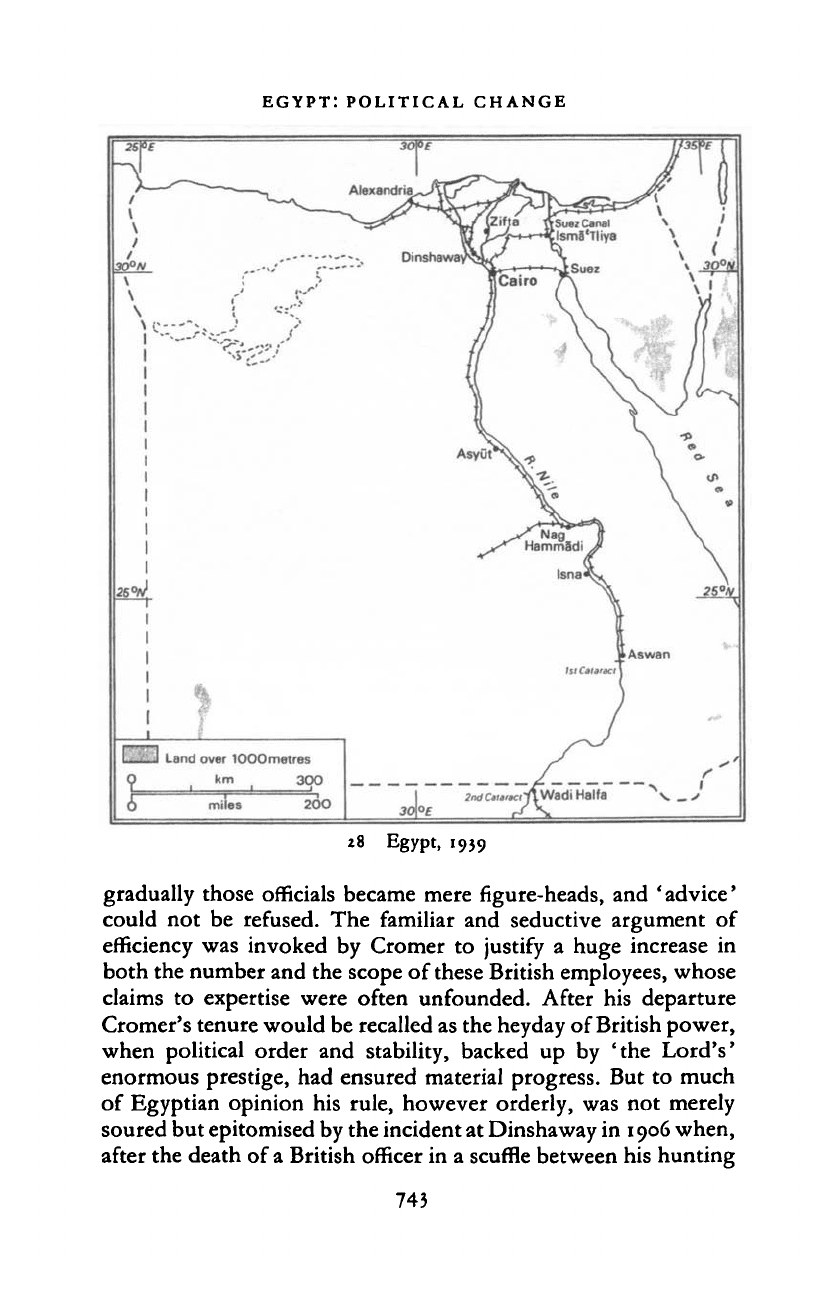
EGYPT: POLITICAL CHANGE
28 Egypt, 1939
gradually those officials became mere figure-heads, and 'advice'
could not be refused. The familiar and seductive argument of
efficiency was invoked by Cromer to justify a huge increase in
both the number and the scope of these British employees, whose
claims to expertise were often unfounded. After his departure
Cromer's tenure would be recalled as the heyday of British power,
when political order and stability, backed up by 'the Lord's'
enormous prestige, had ensured material progress. But to much
of Egyptian opinion his rule, however orderly, was not merely
soured but epitomised by the incident at Dinshaway in 1906 when,
after the death of
a
British officer in a scuffle between his hunting
743
Cambridge Histories Online © Cambridge University Press, 2008
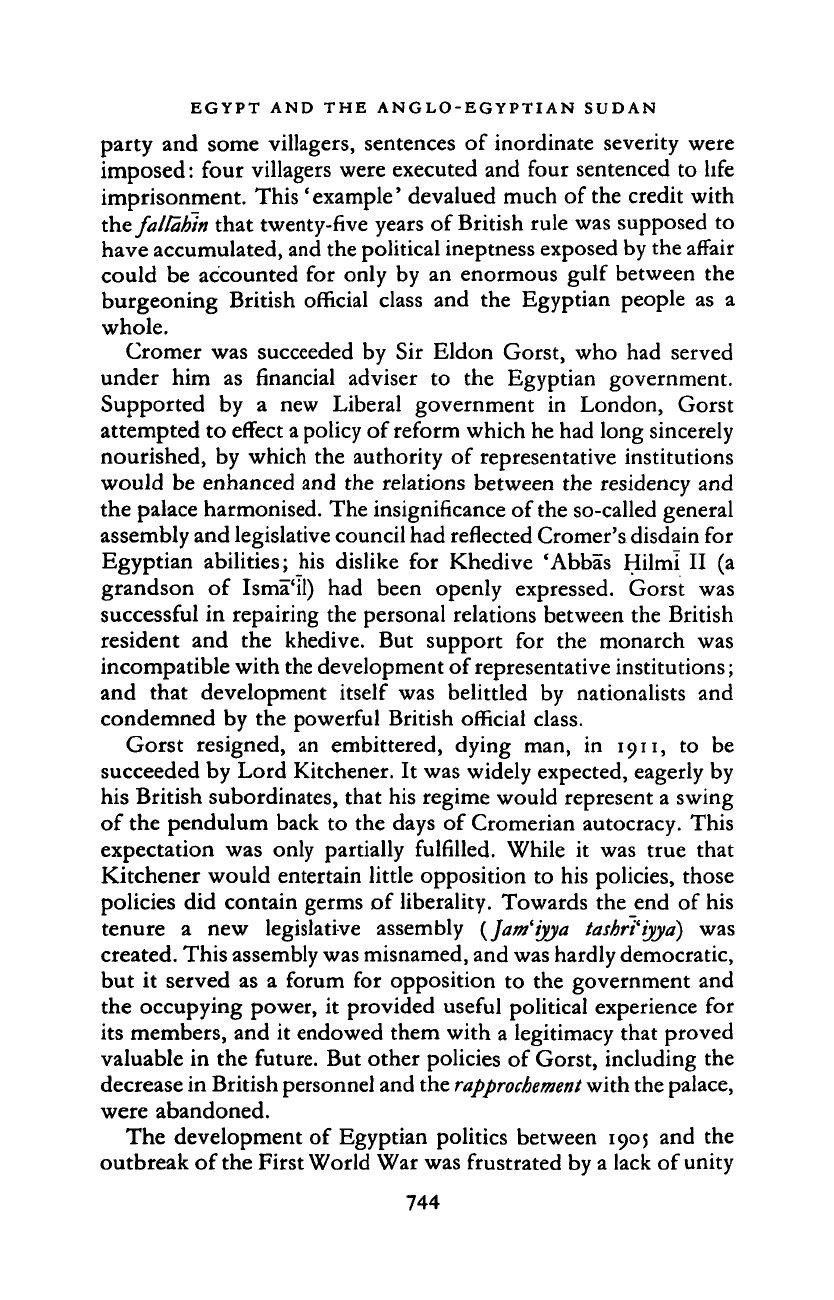
EGYPT AND THE ANGLO-EGYPTIAN SUDAN
party and some villagers, sentences
of
inordinate severity were
imposed: four villagers were executed and four sentenced to life
imprisonment. This 'example' devalued much of the credit with
the fallahin that twenty-five years of British rule was supposed to
have accumulated, and the political ineptness exposed by the affair
could be accounted for only by an enormous gulf between the
burgeoning British official class and the Egyptian people
as a
whole.
Cromer was succeeded by Sir Eldon Gorst, who had served
under him
as
financial adviser
to the
Egyptian government.
Supported
by a
new Liberal government
in
London, Gorst
attempted to effect
a
policy of reform which he had long sincerely
nourished, by which the authority
of
representative institutions
would be enhanced and the relations between the residency and
the palace harmonised. The insignificance of the so-called general
assembly and legislative council had reflected Cromer's disdain for
Egyptian abilities; his dislike
for
Khedive 'Abbas Hilmi
II (a
grandson
of
Isma'il)
had
been openly expressed. Gorst was
successful in repairing the personal relations between the British
resident and
the
khedive. But support
for the
monarch was
incompatible with the development of representative institutions;
and that development itself was belittled
by
nationalists and
condemned by the powerful British official class.
Gorst resigned,
an
embittered, dying man,
in
1911,
to be
succeeded by Lord Kitchener. It was widely expected, eagerly by
his British subordinates, that his regime would represent a swing
of the pendulum back to the days of Cromerian autocracy. This
expectation was only partially fulfilled. While
it
was true that
Kitchener would entertain little opposition to his policies, those
policies did contain germs of liberality. Towards the end of his
tenure
a new
legislative assembly (Jam'tyja tashri
1
iyyd)
was
created. This assembly was misnamed, and was hardly democratic,
but
it
served as
a
forum for opposition to the government and
the occupying power,
it
provided useful political experience for
its members, and it endowed them with a legitimacy that proved
valuable in the future. But other policies of Gorst, including the
decrease in British personnel and the
rapprochement
with the palace,
were abandoned.
The development
of
Egyptian politics between 1905 and the
outbreak of the First World War was frustrated by a lack of unity
744
Cambridge Histories Online © Cambridge University Press, 2008
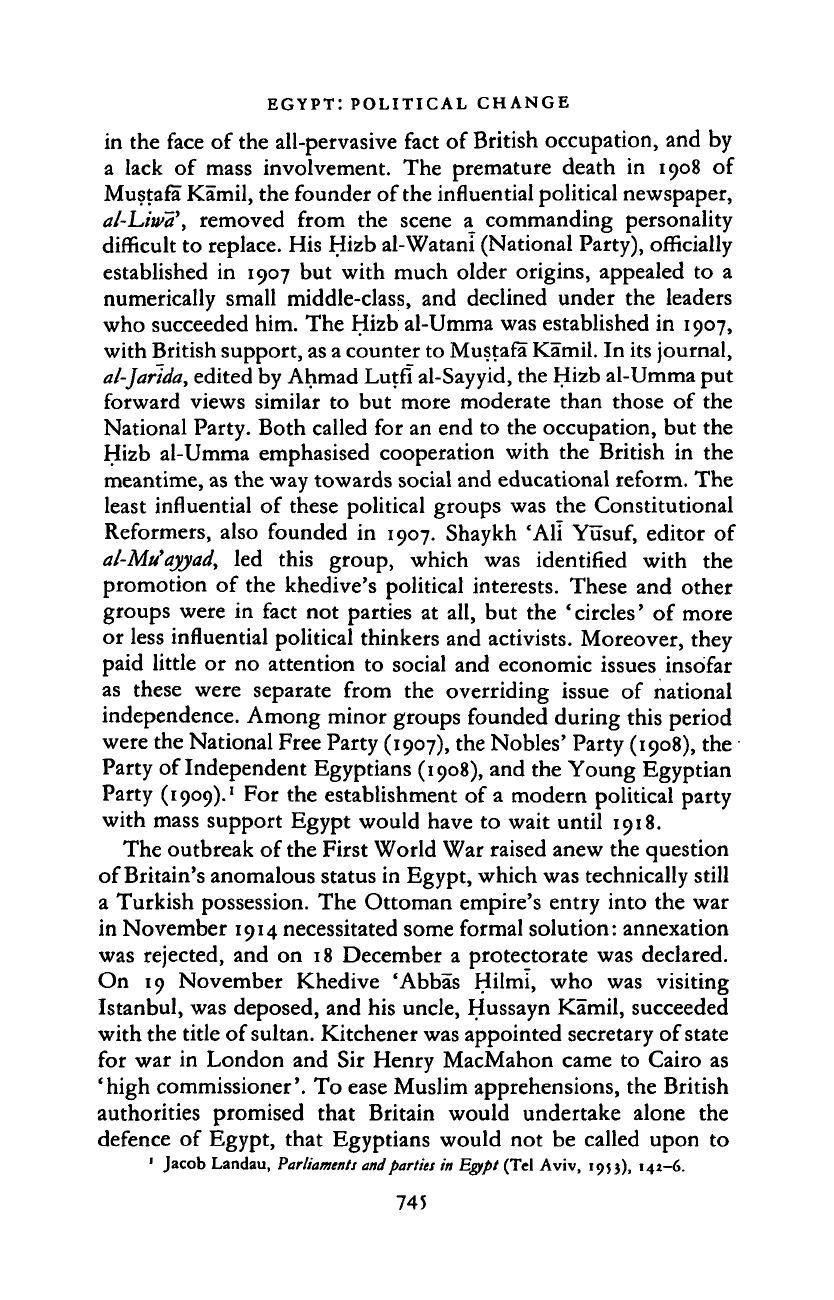
EGYPT: POLITICAL CHANGE
in the face of the all-pervasive fact of British occupation, and by
a lack of mass involvement. The premature death in 1908 of
Mustafa Kamil, the founder of the influential political newspaper,
al-L.iwa\ removed from the scene a commanding personality
difficult to replace. His Hizb al-Watani (National Party), officially
established in 1907 but with much older origins, appealed to a
numerically small middle-class, and declined under the leaders
who succeeded him. The Hizb al-Umma was established in 1907,
with British support, as a counter to Mustafa Kamil. In its journal,
al-Jarida,
edited by Ahmad Lutfi al-Sayyid, the Hizb al-Umma put
forward views similar to but more moderate than those of the
National Party. Both called for an end to the occupation, but the
Hizb al-Umma emphasised cooperation with the British in the
meantime, as the way towards social and educational reform. The
least influential of these political groups was the Constitutional
Reformers, also founded in 1907. Shaykh 'Ali
Yusuf,
editor of
al-Mu'ayyad, led this group, which was identified with the
promotion of the khedive's political interests. These and other
groups were in fact not parties at all, but the '
circles'
of more
or less influential political thinkers and activists. Moreover, they
paid little or no attention to social and economic issues insofar
as these were separate from the overriding issue of national
independence. Among minor groups founded during this period
were the National Free Party (1907), the Nobles' Party (1908), the
Party of Independent Egyptians (1908), and the Young Egyptian
Party (1909).
1
For the establishment of a modern political party
with mass support Egypt would have to wait until 1918.
The outbreak of the First World War raised anew the question
of Britain's anomalous status in Egypt, which was technically still
a Turkish possession. The Ottoman empire's entry into the war
in November 1914 necessitated some formal solution: annexation
was rejected, and on 18 December a protectorate was declared.
On 19 November Khedive 'Abbas Hilmi, who was visiting
Istanbul, was deposed, and his uncle, Hussayn Kamil, succeeded
with the title of sultan. Kitchener was appointed secretary of state
for war in London and Sir Henry MacMahon came to Cairo as
'high commissioner'. To ease Muslim apprehensions, the British
authorities promised that Britain would undertake alone the
defence of Egypt, that Egyptians would not be called upon to
1
Jacob Landau, Parliaments and parties in Egypt (Tel Aviv, 1953), 142-6.
745
Cambridge Histories Online © Cambridge University Press, 2008
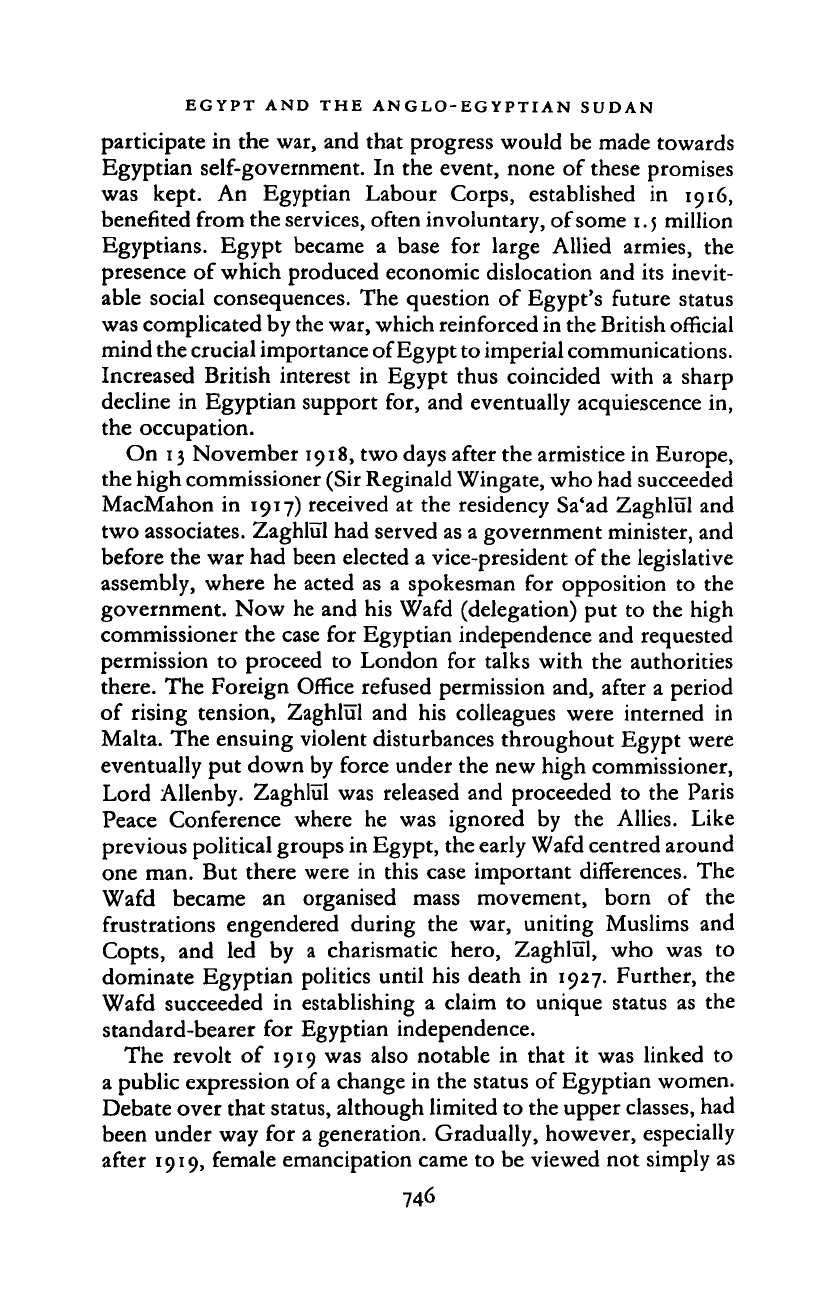
EGYPT AND THE ANGLO-EGYPTIAN SUDAN
participate in the war, and that progress would be made towards
Egyptian self-government. In the event, none of these promises
was kept.
An
Egyptian Labour Corps, established
in
1916,
benefited from the services, often involuntary, of some 1.5 million
Egyptians. Egypt became
a
base
for
large Allied armies,
the
presence of which produced economic dislocation and its inevit-
able social consequences. The question of Egypt's future status
was complicated by the war, which reinforced in the British official
mind the crucial importance of Egypt to imperial communications.
Increased British interest in Egypt thus coincided with
a
sharp
decline in Egyptian support for, and eventually acquiescence in,
the occupation.
On 13 November 1918, two days after the armistice in Europe,
the high commissioner (Sir Reginald Wingate, who had succeeded
MacMahon in 1917) received at the residency Sa'ad Zaghlul and
two associates. Zaghlul had served as a government minister, and
before the war had been elected a vice-president of the legislative
assembly, where he acted as
a
spokesman for opposition
to
the
government. Now he and his Wafd (delegation) put to the high
commissioner the case for Egyptian independence and requested
permission to proceed to London for talks with the authorities
there. The Foreign Office refused permission and, after a period
of rising tension, Zaghlul and his colleagues were interned
in
Malta. The ensuing violent disturbances throughout Egypt were
eventually put down by force under the new high commissioner,
Lord Allenby. Zaghlul was released and proceeded to the Paris
Peace Conference where
he
was ignored
by the
Allies. Like
previous political groups in Egypt, the early Wafd centred around
one man. But there were in this case important differences. The
Wafd became
an
organised mass movement, born
of the
frustrations engendered during the war, uniting Muslims and
Copts,
and led by a
charismatic hero, Zaghlul, who was
to
dominate Egyptian politics until his death in 1927. Further, the
Wafd succeeded
in
establishing
a
claim
to
unique status as the
standard-bearer for Egyptian independence.
The revolt
of
1919 was also notable
in
that
it
was linked
to
a public expression of
a
change in the status of Egyptian women.
Debate over that status, although limited to the upper classes, had
been under way for a generation. Gradually, however, especially
after 1919, female emancipation came to be viewed not simply as
746
Cambridge Histories Online © Cambridge University Press, 2008
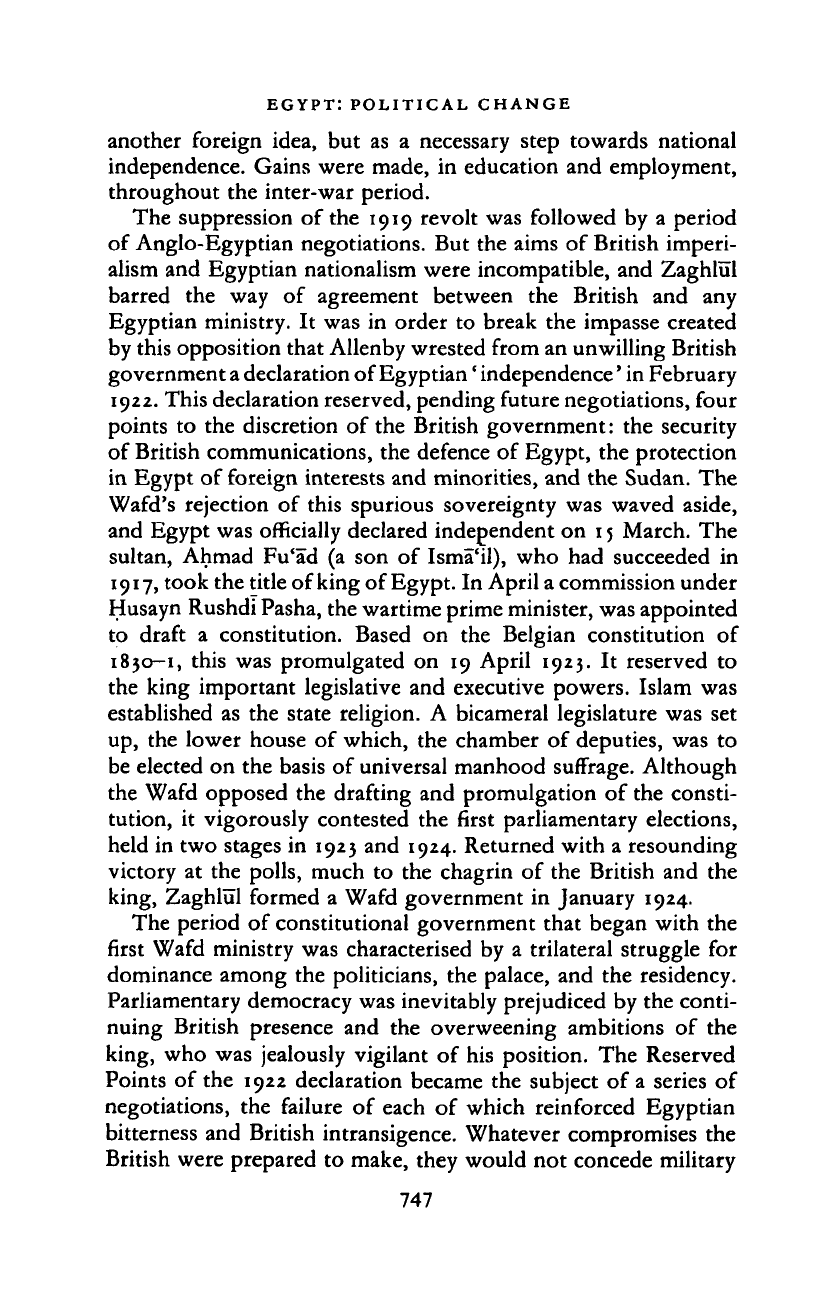
EGYPT: POLITICAL CHANGE
another foreign idea, but as
a
necessary step towards national
independence. Gains were made, in education and employment,
throughout the inter-war period.
The suppression of the 1919 revolt was followed by
a
period
of Anglo-Egyptian negotiations. But the aims of British imperi-
alism and Egyptian nationalism were incompatible, and Zaghlul
barred
the
way
of
agreement between
the
British
and any
Egyptian ministry.
It
was in order to break the impasse created
by this opposition that Allenby wrested from an unwilling British
government
a
declaration of Egyptian' independence' in February
1922.
This declaration reserved, pending future negotiations, four
points to the discretion of the British government: the security
of British communications, the defence of Egypt, the protection
in Egypt of foreign interests and minorities, and the Sudan. The
Wafd's rejection
of
this spurious sovereignty was waved aside,
and Egypt was officially declared independent on 15 March. The
sultan, Ahmad Fu'ad
(a
son
of
Isma'il), who had succeeded
in
1917,
took the title of king of Egypt. In April a commission under
Husayn Rushdi Pasha, the wartime prime minister, was appointed
to draft
a
constitution. Based
on
the Belgian constitution
of
1830-1,
this was promulgated on 19 April 1923.
It
reserved
to
the king important legislative and executive powers. Islam was
established as the state religion.
A
bicameral legislature was set
up,
the lower house of which, the chamber of deputies, was
to
be elected on the basis of universal manhood suffrage. Although
the Wafd opposed the drafting and promulgation of the consti-
tution,
it
vigorously contested the first parliamentary elections,
held in two stages in 1923 and 1924. Returned with a resounding
victory
at
the polls, much to the chagrin
of
the British and the
king, Zaghlul formed
a
Wafd government in January 1924.
The period of constitutional government that began with the
first Wafd ministry was characterised by
a
trilateral struggle for
dominance among the politicians, the palace, and the residency.
Parliamentary democracy was inevitably prejudiced by the conti-
nuing British presence and the overweening ambitions
of
the
king, who was jealously vigilant
of
his position. The Reserved
Points of the 1922 declaration became the subject of a series of
negotiations, the failure
of
each
of
which reinforced Egyptian
bitterness and British intransigence. Whatever compromises the
British were prepared to make, they would not concede military
747
Cambridge Histories Online © Cambridge University Press, 2008
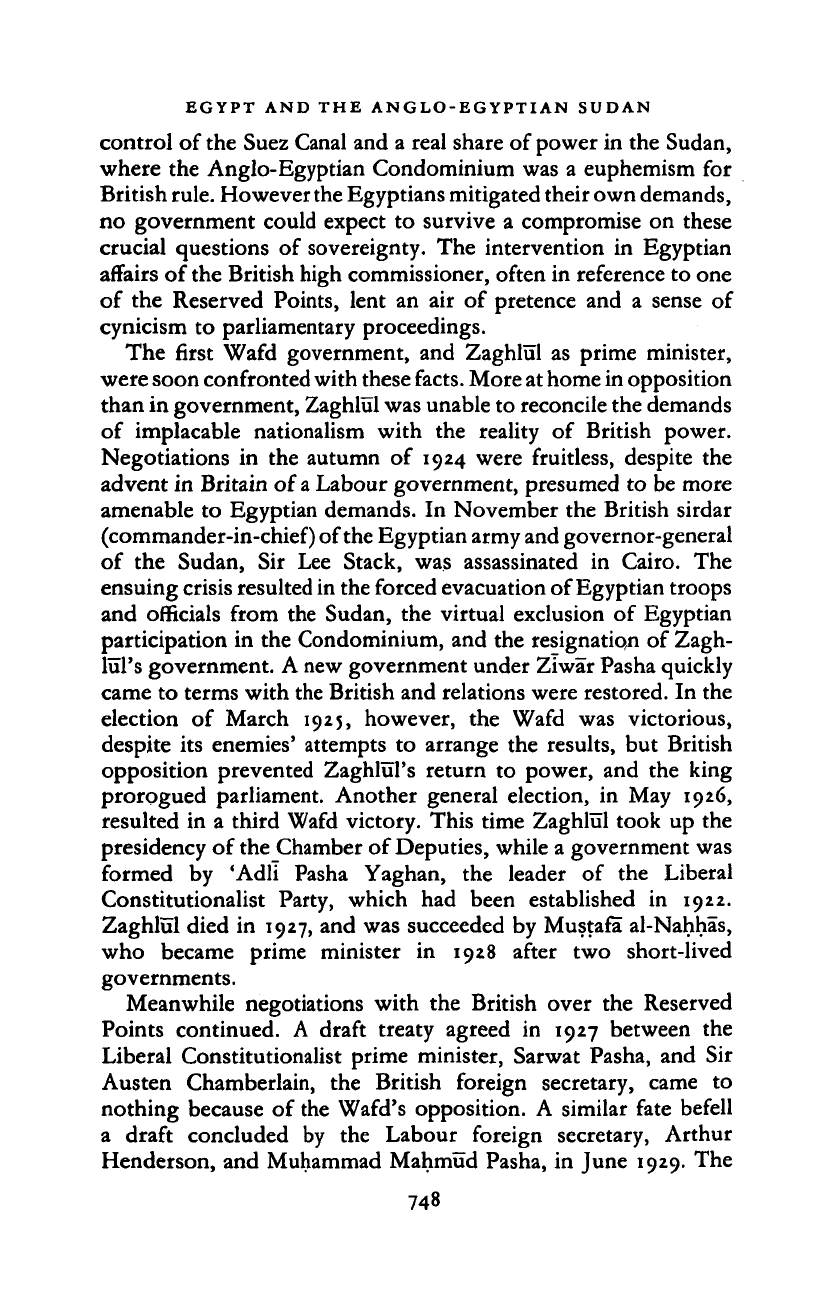
EGYPT AND THE ANGLO-EGYPTIAN SUDAN
control of the Suez Canal and a real share of power in the Sudan,
where the Anglo-Egyptian Condominium was a euphemism for
British
rule.
However the Egyptians mitigated their own demands,
no government could expect to survive a compromise on these
crucial questions of sovereignty. The intervention
in
Egyptian
affairs of the British high commissioner, often in reference to one
of the Reserved Points, lent
an
air
of
pretence and
a
sense of
cynicism to parliamentary proceedings.
The first Wafd government, and Zaghlul as prime minister,
were soon confronted with these facts. More at home in opposition
than in government, Zaghlul was unable to reconcile the demands
of implacable nationalism with
the
reality
of
British power.
Negotiations
in
the autumn
of
1924 were fruitless, despite the
advent in Britain of
a
Labour government, presumed to be more
amenable to Egyptian demands. In November the British sirdar
(commander-in-chief) of the Egyptian army and governor-general
of the Sudan,
Sir
Lee Stack, was assassinated
in
Cairo. The
ensuing crisis resulted in the forced evacuation of Egyptian troops
and officials from the Sudan, the virtual exclusion
of
Egyptian
participation in the Condominium, and the resignation of Zagh-
lul's government. A new government under Ziwar Pasha quickly
came to terms with the British and relations were restored. In the
election
of
March 1925, however,
the
Wafd was victorious,
despite its enemies' attempts
to
arrange the results, but British
opposition prevented ZaghluFs return
to
power, and the king
prorogued parliament. Another general election,
in
May 1926,
resulted in
a
third Wafd victory. This time Zaghlul took up the
presidency of the Chamber of
Deputies,
while a government was
formed
by
'Adli Pasha Yaghan,
the
leader
of the
Liberal
Constitutionalist Party, which
had
been established
in
1922.
Zaghlul died in 1927, and was succeeded by Mustafa al-Nahhas,
who became prime minister
in
1928 after
two
short-lived
governments.
Meanwhile negotiations with the British over the Reserved
Points continued.
A
draft treaty agreed
in
1927 between
the
Liberal Constitutionalist prime minister, Sarwat Pasha, and Sir
Austen Chamberlain,
the
British foreign secretary, came
to
nothing because of the Wafd's opposition. A similar fate befell
a draft concluded
by the
Labour foreign secretary, Arthur
Henderson, and Muhammad Mahmud Pasha, in June 1929. The
748
Cambridge Histories Online © Cambridge University Press, 2008
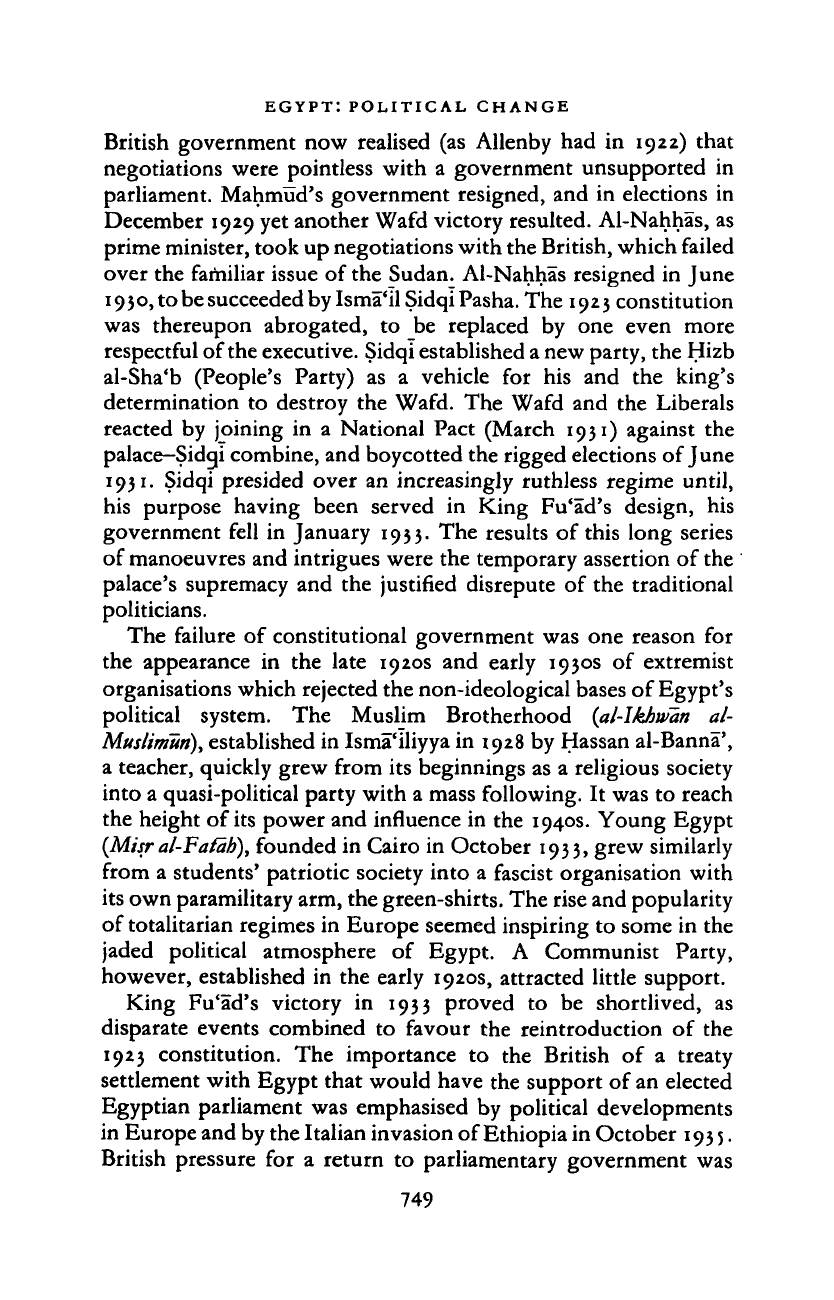
EGYPT:
POLITICAL CHANGE
British government now realised (as Allenby had
in
1922) that
negotiations were pointless with
a
government unsupported
in
parliament. Mahmud's government resigned, and in elections in
December 1929 yet another Wafd victory resulted. Al-Nahhas, as
prime minister, took up negotiations with the British, which failed
over the familiar issue of the Sudan. Al-Nahhas resigned in June
1930,
to
be
succeeded by Isma'il Sidqi
Pasha.
The
1923
constitution
was thereupon abrogated,
to be
replaced
by
one even more
respectful of the executive. Sidqi established
a
new party, the Hizb
al-Sha'b (People's Party)
as a
vehicle
for his and the
king's
determination to destroy the Wafd. The Wafd and the Liberals
reacted by joining
in a
National Pact (March 1931) against the
palace-Sidqi combine, and boycotted the rigged elections of June
1931.
Sidqi presided over an increasingly ruthless regime until,
his purpose having been served
in
King Fu'ad's design,
his
government fell in January 1933. The results of this long series
of manoeuvres and intrigues were the temporary assertion of the
palace's supremacy and the justified disrepute of the traditional
politicians.
The failure of constitutional government was one reason for
the appearance
in
the late 1920s and early 1930s
of
extremist
organisations which rejected the non-ideological bases of Egypt's
political system.
The
Muslim Brotherhood (al-lkhwan
al-
Muslimuri),
established in Isma'iliyya in 1928 by Hassan al-Banna',
a teacher, quickly grew from its beginnings as a religious society
into a quasi-political party with a mass following. It was to reach
the height of its power and influence in the 1940s. Young Egypt
{Misral-Fafah),
founded in Cairo in October
1933,
grew similarly
from a students' patriotic society into a fascist organisation with
its own paramilitary arm, the green-shirts. The rise and popularity
of totalitarian regimes in Europe seemed inspiring to some in the
jaded political atmosphere
of
Egypt.
A
Communist Party,
however, established in the early 1920s, attracted little support.
King Fu'ad's victory
in
1933 proved
to be
shortlived,
as
disparate events combined
to
favour the reintroduction
of
the
1923 constitution. The importance
to
the British
of a
treaty
settlement with Egypt that would have the support of an elected
Egyptian parliament was emphasised by political developments
in Europe and by the Italian invasion of Ethiopia in October 1935.
British pressure for
a
return
to
parliamentary government was
749
Cambridge Histories Online © Cambridge University Press, 2008
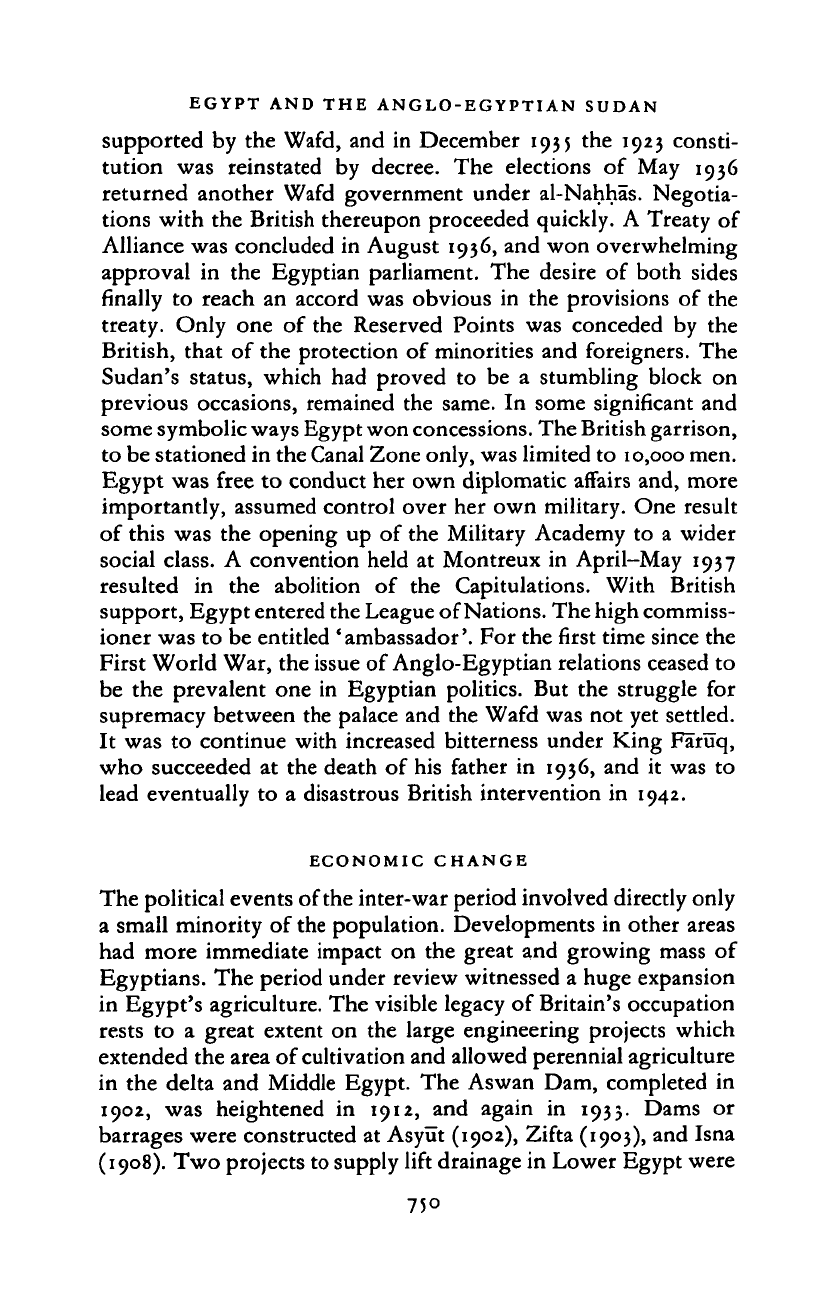
EGYPT AND THE ANGLO-EGYPTIAN SUDAN
supported by the Wafd, and in December 1935 the 1923 consti-
tution was reinstated by decree. The elections of May 1936
returned another Wafd government under al-Nahhas. Negotia-
tions with the British thereupon proceeded quickly. A Treaty of
Alliance was concluded in August 1936, and won overwhelming
approval in the Egyptian parliament. The desire of both sides
finally to reach an accord was obvious in the provisions of the
treaty. Only one of the Reserved Points was conceded by the
British, that of the protection of minorities and foreigners. The
Sudan's status, which had proved to be a stumbling block on
previous occasions, remained the same. In some significant and
some symbolic
ways
Egypt won concessions. The British garrison,
to be stationed in the Canal Zone only, was limited to 10,000 men.
Egypt was free to conduct her own diplomatic affairs and, more
importantly, assumed control over her own military. One result
of this was the opening up of the Military Academy to a wider
social class. A convention held at Montreux in April-May 1937
resulted in the abolition of the Capitulations. With British
support, Egypt entered the League of Nations. The high commiss-
ioner was to be entitled 'ambassador'. For the first time since the
First World War, the issue of Anglo-Egyptian relations ceased to
be the prevalent one in Egyptian politics. But the struggle for
supremacy between the palace and the Wafd was not yet settled.
It was to continue with increased bitterness under King Faruq,
who succeeded at the death of his father in 1936, and it was to
lead eventually to a disastrous British intervention in 1942.
ECONOMIC CHANGE
The political events of the inter-war period involved directly only
a small minority of the population. Developments in other areas
had more immediate impact on the great and growing mass of
Egyptians. The period under review witnessed a huge expansion
in Egypt's agriculture. The visible legacy of Britain's occupation
rests to a great extent on the large engineering projects which
extended the area of cultivation and allowed perennial agriculture
in the delta and Middle Egypt. The Aswan Dam, completed in
1902,
was heightened in 1912, and again in 1933. Dams or
barrages were constructed at Asyut (1902), Zifta (1903), and Isna
(1908).
Two projects to supply lift drainage in Lower Egypt were
75O
Cambridge Histories Online © Cambridge University Press, 2008
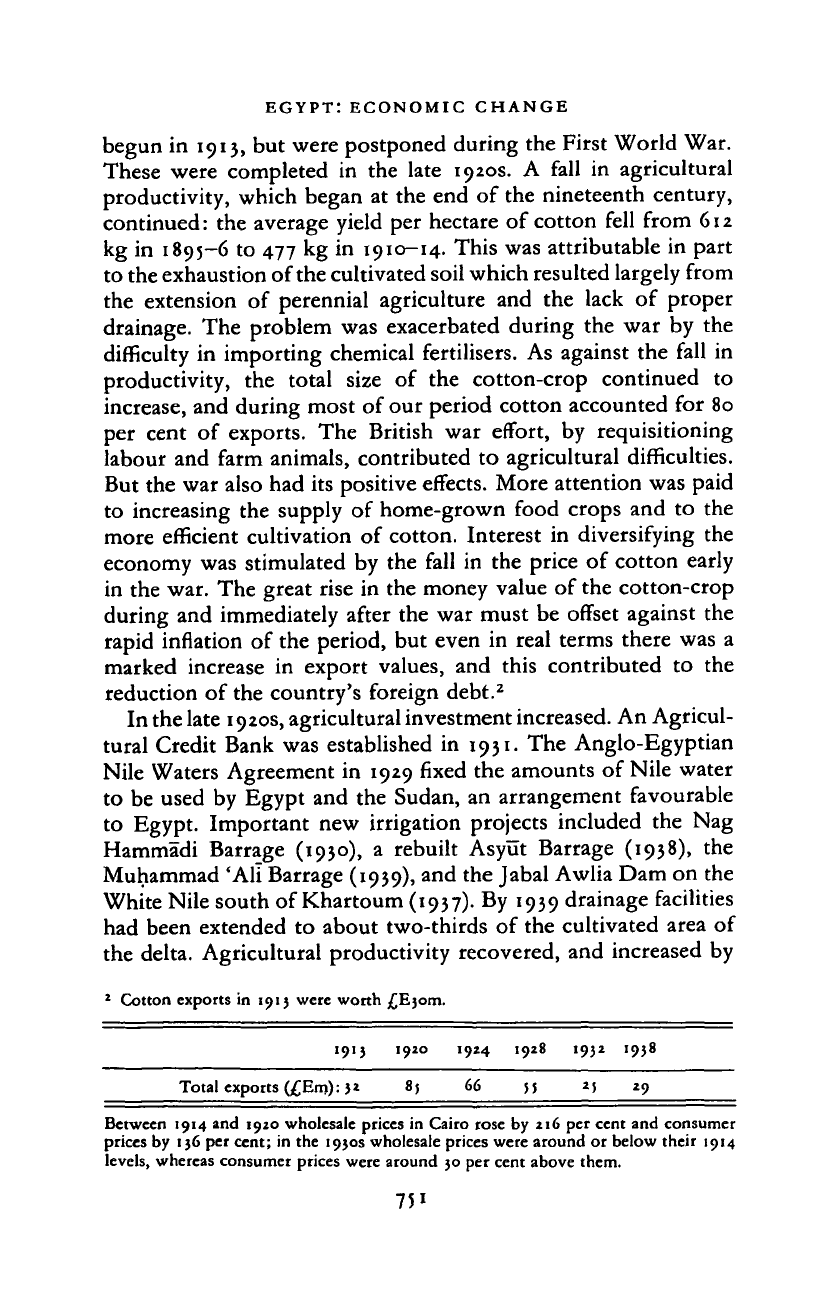
EGYPT: ECONOMIC CHANGE
begun in 1913, but were postponed during the First World War.
These were completed
in
the late 1920s.
A
fall
in
agricultural
productivity, which began at the end of the nineteenth century,
continued: the average yield per hectare of cotton fell from 612
kg in 1895-6 to 477 kg in 1910-14. This was attributable in part
to the exhaustion of the cultivated soil which resulted largely from
the extension
of
perennial agriculture and
the
lack
of
proper
drainage. The problem was exacerbated during the war by the
difficulty in importing chemical fertilisers. As against the fall
in
productivity,
the
total size
of the
cotton-crop continued
to
increase, and during most of our period cotton accounted for 80
per cent
of
exports. The British war effort,
by
requisitioning
labour and farm animals, contributed to agricultural difficulties.
But the war also had its positive effects. More attention was paid
to increasing the supply
of
home-grown food crops and
to
the
more efficient cultivation of cotton. Interest
in
diversifying the
economy was stimulated by the fall
in
the price of cotton early
in the war. The great rise in the money value of the cotton-crop
during and immediately after the war must be offset against the
rapid inflation of the period, but even
in
real terms there was
a
marked increase
in
export values, and this contributed
to the
reduction of the country's foreign debt.
2
In the late
1920s,
agricultural investment increased. An Agricul-
tural Credit Bank was established
in
1931. The Anglo-Egyptian
Nile Waters Agreement in 1929 fixed the amounts of Nile water
to be used by Egypt and the Sudan, an arrangement favourable
to Egypt. Important new irrigation projects included the Nag
Hammadi Barrage (1930),
a
rebuilt Asyut Barrage (1938),
the
Muhammad 'Ali Barrage (1939), and the Jabal Awlia Dam on the
White Nile south of Khartoum (1937). By 1939 drainage facilities
had been extended to about two-thirds of the cultivated area of
the delta. Agricultural productivity recovered, and increased by
2
Cotton exports in 1913 were worth
1913
Total exports (£Em): 32
£E3on
1920
85
1924
66
1928
55
1932
*»
1938
*9
Between 1914 and 1920 wholesale prices
in
Cairo rose
by
216 per cent and consumer
prices by 136 per cent;
in
the 1930s wholesale prices were around or below their 1914
levels,
whereas consumer prices were around 30 per cent above them.
7JI
Cambridge Histories Online © Cambridge University Press, 2008
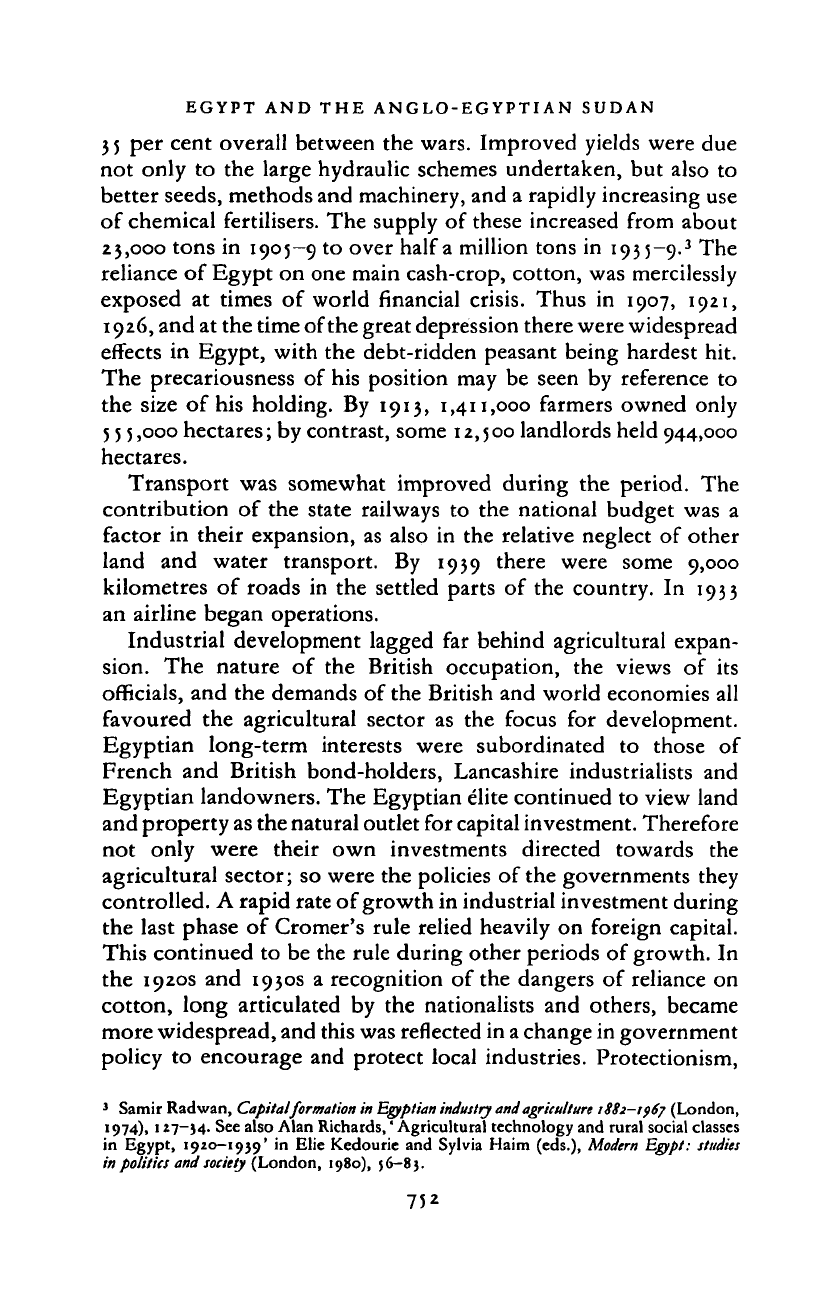
EGYPT AND THE ANGLO-EGYPTIAN SUDAN
3 5
per cent overall between the wars. Improved yields were due
not only
to
the large hydraulic schemes undertaken, but also
to
better seeds, methods and machinery, and a rapidly increasing use
of chemical fertilisers. The supply
of
these increased from about
23,000 tons
in
1905-9 to over half
a
million tons in
193
5-9.
3
The
reliance
of
Egypt on one main cash-crop, cotton, was mercilessly
exposed
at
times
of
world financial crisis. Thus
in
1907, 1921,
1926,
and at the time of the great depression there were widespread
effects
in
Egypt, with the debt-ridden peasant being hardest hit.
The precariousness
of
his position may
be
seen
by
reference
to
the size
of
his holding.
By
1913,
1,411,000
farmers owned only
5 5
5,000
hectares; by contrast, some 12,500 landlords held 944,000
hectares.
Transport was somewhat improved during
the
period.
The
contribution
of
the state railways
to the
national budget was
a
factor
in
their expansion, as also
in
the relative neglect
of
other
land
and
water transport.
By 1939
there were some 9,000
kilometres
of
roads
in
the settled parts
of
the country.
In
1933
an airline began operations.
Industrial development lagged
far
behind agricultural expan-
sion.
The
nature
of
the British occupation,
the
views
of its
officials, and the demands
of
the British and world economies all
favoured
the
agricultural sector
as the
focus
for
development.
Egyptian long-term interests were subordinated
to
those
of
French
and
British bond-holders, Lancashire industrialists
and
Egyptian landowners. The Egyptian elite continued to view land
and property as the natural outlet for capital investment. Therefore
not only were their
own
investments directed towards
the
agricultural sector; so were the policies of the governments they
controlled. A rapid rate of growth in industrial investment during
the last phase
of
Cromer's rule relied heavily on foreign capital.
This continued
to
be the rule during other periods of growth.
In
the 1920s and 1930s
a
recognition
of
the dangers
of
reliance on
cotton, long articulated
by the
nationalists
and
others, became
more widespread, and this was reflected in
a
change in government
policy
to
encourage and protect local industries. Protectionism,
3
Samir Radwan, Capital
formation in Egyptian industry
and
agriculture
iSfc-rpi? (London,
1974),
127-34. See also Alan Richards,' Agricultural technology and rural social classes
in Egypt, 1920-1939'
in
Elie Kedourie and Sylvia Haim (eds.),
Modern
Egypt:
studies
in politics and society
(London, 1980), 56-8).
752
Cambridge Histories Online © Cambridge University Press, 2008
